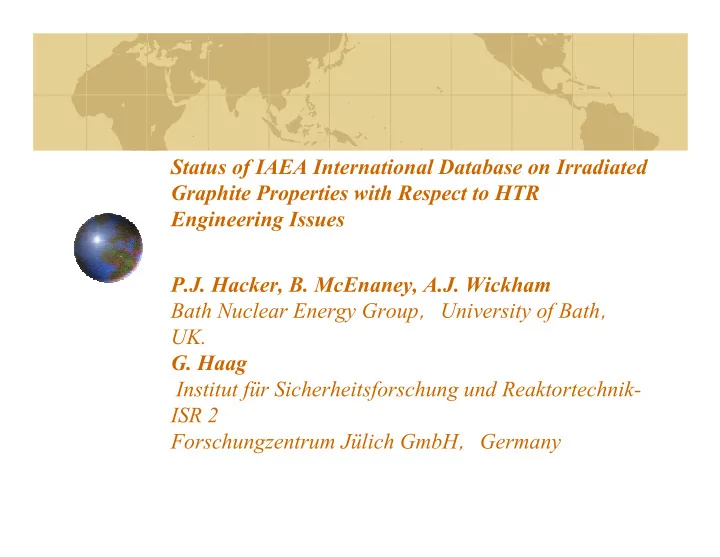

Status of IAEA International Database on Irradiated Graphite Properties with Respect to HTR Engineering Issues P.J. Hacker, B. McEnaney, A.J. Wickham Bath Nuclear Energy Group , University of Bath , UK. G. Haag Institut für Sicherheitsforschung und Reaktortechnik- ISR 2 Forschungzentrum Jülich GmbH , Germany
Plan of Talk • Organisation & Management of Database • Operation of the Database • Relevance to New Designs of HTR • Conclusions Bath Nuclear Energy Group Database Website: http://www-andis.iaea.org/graphite.html
Purpose of Graphite Database • To facilitate development of national and international programmes on graphite moderated reactors and fusion technologies • To assist the safety authorities in the assessment of safety aspects of graphite moderated reactors, including decommissioning • To serve as a comprehensive source of scientific information for a broad range of material science applications, including non-nuclear technology.
Database Members • Full members: – Germany (represented by FZJ) – Japan – United Kingdom – USA • Associate Member: – Lithuania Bath Nuclear Energy Group
Database Sponsors • NGOs that make voluntary contributions to operation and maintenance of the Database. • Present Sponsors – Toyo Tanso, Japan – Eskom Enterprises, South Africa Bath Nuclear Energy Group
Steering Committee - Remit • Technical matters concerning the Database • Development of operating procedures • Financial aspects • Annual report Bath Nuclear Energy Group
Steering Committee- Membership • Germany Dr G Haag, FZJ • Japan Dr K Sawa, JAERI • UK Dr AJ Wickham*, Consultant • USA Dr TD Burchell, ORNL • Lithuania Dr R Levinskas, LEI • IAEA representatives * Chair until February 2002 Bath Nuclear Energy Group
Plan of Talk • Organisation & Management of Database • Operation of the Database • Relevance to New Designs of HTR • Conclusions Bath Nuclear Energy Group Database Website: http://www-andis.iaea.org/graphite.html
Technical Objectives • User friendly using Microsoft Access 97 • No specialist IT knowledge • Clear presentation of data • Flexible methods of data retrieval • Flexible structure for different data types • Secure methods of data distribution by CD ROM Bath Nuclear Energy Group
Classification of Data • Unrestricted data – open literature data & data for free dissemination • Restricted data – available for non- commercial purposes to other Database members by CD ROM • L2 Restricted data – as Restricted data but users sign confidentiality agreement with data supplier
Types of data • Changes in physical & mechanical properties of nuclear graphites upon fast neutron irradiation • Differing units, standards and definitions are an issue • Those used by the data supplier are entered in the Database • Conversion factors are available in the Database Bath Nuclear Energy Group
Examples of Data • Sample characterisation • Thermal conductivity Irradiation temperature • Strength – Fluence Tensile, – – Graphite grade Flexural, – – Experiment number, etc Compressive – – • Crystalline parameters • Poisson’s ratio a, c, L a , L c etc • Dimensional change – • Elastic moduli • Irradiation creep properties • Electrical resistivity Applied stress – • Coefficient of thermal Creep strain etc – expansion • Acoustic properties • Density and porosity • Stored energy
Using the Database Query Screens Tables Reports Program Codes etc Tables – Spreadsheets of data from Volumes Volumes – Original data sources stored in Database Reports – Outputs from the Database
Using the Database • Select Country of Origin of Data • Select Experiments from Volumes of Data • Select desired Properties to obtain Report • Refine Report by Sorting and Filtering • Export refined Report to User’s applications, e.g., Microsoft Excel.
Plan of Talk • Organisation & Management of Database • Operation of the Database • Relevance to New Designs of HTR • Conclusions Bath Nuclear Energy Group Database Website: http://www-andis.iaea.org/graphite.html
Relevance to New Designs of HTR • The Database contains data that is relevant to the irradiation temperature – neutron fluence domains for various designs of HTR. • Data for new types of graphite being considered for new HTR designs may not be incorporated, but generic data in the Database may be useful for scoping studies. • Desirable that new MTR data be incorporated into the Database to extend its usefulness.
Operating Temperature & Lifetime Neutron Fluence for Graphite Components in the HTR-500 Component Depth/m Operating Fluence/ temp/ o C 10 22 n cm -2 (EDN) Top reflector - 250 1.5 Core 2.0 450 3.4 Core 3.0 475 1.9 Core 4.0 650 1.2 Core 5.0 675 0.8 Bottom reflector - 700 0.4
Effect of Neutron Irradiation in the Range 720-770 o C upon the Young’s Modulus of a Nuclear Graphite 2.0 1.8 Normalised Young's Modulus E/E o 1.6 1.4 1.2 1.0 0.8 0.6 0.4 0.2 0.0 0 5 10 15 20 25 30 20 n cm -2 (EDN) Neutron Fluence/ 10 Bath Nuclear Energy Group
The Effect of Neutron Irradiation on the Relative Dimensional Changes of a Nuclear Graphite. 0.5 0.0 Relative dimensional change/% -0.5 o C Axial, 1350-1450 -1.0 -1.5 -2.0 -2.5 o C Radial, 1320-1420 -3.0 0 20 40 60 80 20 n cm -2 (EDN) Neutron fluence/ 10 Bath Nuclear Energy Group
Effect of Neutron Irradiation at 1115- 1165 o C upon the CTE of a Nuclear Graphite. 20 10 Relative CTE change/% 0 -10 -20 -30 -40 0 10 20 30 40 50 20 n cm -2 (EDN) Neutron fluence/ 10 Bath Nuclear Energy Group
Conclusions • The IAEA International Database on Irradiated Graphite Properties contains much useful data for designers of new HTR • Its usefulness can be enhanced if additional, extant data can be incorporated along with….. • Any new MTR data collected to support new designs of HTR. Bath Nuclear Energy Group Database Website: http://www-andis.iaea.org/graphite.html
Acknowledgments • Mr RE Clark, IAEA • Dr J Stephens, IAEA • IAEA, Atomic & Molecular Data Unit, Department of Nuclear Sciences & Applications Database Website: http://www-andis.iaea.org/graphite.html Bath Nuclear Energy Group
Recommend
More recommend